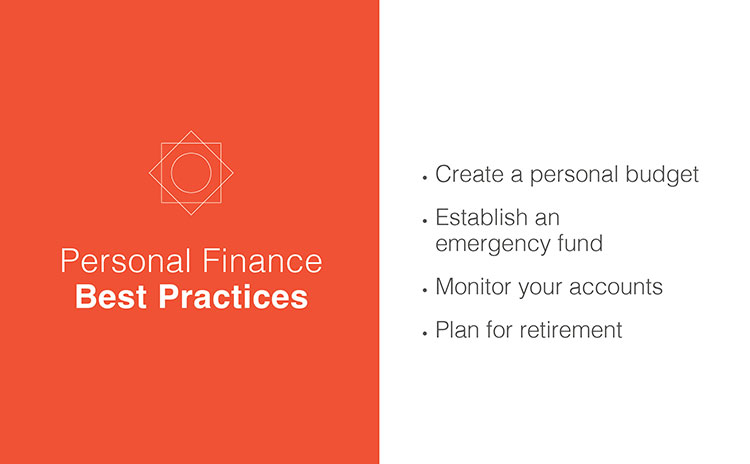4 simple steps for improving your financial health
Following personal finance best practices is something we all know we can benefit from, yet is so often overlooked. This could be a result of feeling overwhelmed or unsure about the best ways to build and grow your personal savings.

Personal money management involves both short and long-term thinking, with strategies ranging from following a monthly budget to planning for your retirement. You might be trying to save up for a down payment on a home, or you might be trying to cut back on unnecessary discretionary spending.
No matter what your specific goals are, if you’re looking to improve your personal finances, it all starts with being more aware and intentional with your habits. Here’s a breakdown of some of the most effective practices you can incorporate today:
- Create a personal budget: No matter where you’re at on your personal financial journey, creating a budget is simple yet critical. Without tracking the money coming in and out of your wallet on a regular basis, you can’t effectively pursue other personal finance strategies. The good news is that most digital banking platforms make it easy to track your spending habits. A budget paints a clear picture of your biggest expenses and helps you identify areas to consider changing if you want to save more. Here’s a detailed breakdown of how to create a budget.
- Establish an emergency fund: A personal budget will account for all of your planned expenses. While that’s very helpful, it leaves out the unplanned expenses that can happen at any time. It could be car troubles, a sick pet, or any other significant surprise expenses that arise. Building off your personal budget, identify how much of your income you can afford to set aside for emergencies like these.
- Monitor your accounts: In a world that’s both busy and digitized, it’s easy to pay little attention to what exact payments are being made and what your bank account(s) look like. It’s a good habit to regularly review your bank statements and credit reports to ensure that everything is accurate. Work with your bank to implement fraud protection measures and safety layers that can prevent unauthorized or erroneous payments from your account. The more proactive and timely you are with monitoring your account activity, the better.
- Plan for retirement: Whether or not retirement is in your near future, the time to save for retirement is now. Anybody earning a taxable income is eligible to contribute to a retirement account, known as an IRA. Your employer may offer a retirement plan to enable you to put a portion of your paycheck into one of these tax-advantaged retirement accounts, so make sure you’re taking advantage of opportunities like these regardless of where you’re at in your career. Any amount you can afford to contribute to your retirement now will better position you for retirement.
No personal finance goal is too big or too small. Being deliberate and conscious about your spending and saving habits can go a long way toward reaching your financial goals today and down the road.
Westfield Bank’s personal banking team can connect you with tools and resources designed to help you on your journey, including retirement accounts and certificates of deposit with competitive rates. Get in touch with our team today.



